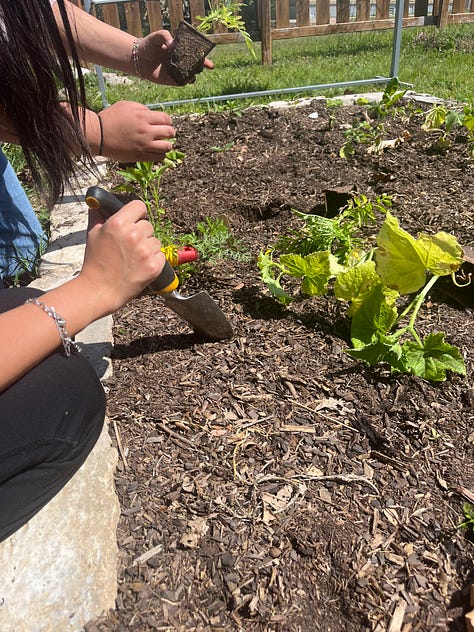
March felt like a whirlwind, but not in a terrible way, which is rare for me to say. A few things I’ve been thinking about this month:
1.) Balancing Between Thing-Doing and Not-Doing
While breaks from school are necessary and deeply appreciated, I tend to crash pretty hard in the first 48-72 hours and struggle to find equilibrium the rest of the time. This spring break, I finally hit the balance between thing-doing and not-doing. I left the house every day, but never for more than 6 hours. I got projects that I can’t face during school done, but preserved had a fair amount of downtime. Most importantly, I did not overschedule to the point that I resented every event in my calendar.
The ironic thing about having this figured out is that I didn’t really try. I thought about this break very little, from a planning perspective, once I decided against traveling. I held one day for work on my master’s program that I needed to get caught up on, and one day for a long-delayed social thing that had been tough to schedule. But otherwise, I just scheduled things as they worked. Which is lovely, and I’m sure there’s a lesson in there, but also…it makes the feeling of balance hard to replicate in the future.



2.) Easing In
I’ve written about the idea of “easing in” after a break before, and that has been key to both the chaos management and the balancing of commitments and space. I fully committed to not making the first two days back hard, and was supported by the calendar (a rarity), in that we could spend our first class day in the garden. This time of learning, certainly, but also getting our hands dirty, getting outside in the actual world, and noticing things that were not on a screen or on a sheet of paper, gave us a chance to get back in the headspace of being in school, but also allowing space for a gentler transition back into structure.
Choosing my battles has never been a strength, at work or elsewhere, as my inclination will always be to fight them all and fight them hard. However, in a slight glimmer of progress the past couple of years, I’ve started taking a “grace week” when we come back from a break in terms of things that are important but that I know are a struggle, most specifically language and cell phones. I really work with my students on code-switching, which involves a lot of me saying, “How you talk outside of this space is up to you, but when we are in the space, we need to shift toward academic and school-appropriate language.” It also sometimes involves me saying, “If I can’t swear in here, neither can you.” That first week back from a break, when our muscles of impulse control haven’t been exercised regularly can be a REAL struggle, so I gently remind us all a thousand times about this process.
Same thing with phones: I am intense about having the phones put away during class. In a wild but I believe accurate overgeneralization, they’re bad for our brains and bad for our learning, and I have to be intense about them or else we accomplish nothing. Our school policy gives one warning before the phone is picked up by an adult to sit in the office for the rest of the day. On about 95% of school days, I enforce this. The first week back from a break, though, I don’t; I remind and remind and remind, but I don’t take anyone’s phone that first week. This is an opportunity for me to remind my students that there are expectations (and why) AND that we won’t perfectly follow them all the time.
3.) Embracing Different Roles in Change
I really appreciated this piece by Satya Doyle Byock about how we can lean into “non-cooperation with evil” in this historical moment. This week, I’m finding the specific note to “be well-written,” as in write down what is happening and how you feel about it regularly, particularly helpful. It’s easy to think that we’re going to remember where we were and what we thought and did, but with as much chaos as is being stirred - intentionally, of course - on a national level, that’s unlikely. Her juxtaposition of the ideas of moment-by-moment check ins, collective refusal to give money to the evil-doers, and finding ways to grind processes to a halt was fascinating to me. Parts of it seem so accessible, and parts of it seem so far away from what feels possible in my day-to-day, and I’m working on being okay with that reality.
During this month (and the one before it), I talked to a friend quite a bit about the concept of change. There are a number of archetypes, including this simple graphic, to think about the ways your skills and strengths can contribute to collective change. What we were talking about, though, was more about our natural inclinations and comfort around change: should it be fast and furious (because the urgency is now and the need is huge) or more incremental and considered (because let’s do it right once and not leave anyone behind in the process)? Are we out on the front lines immediately experimenting with ideas, or quietly bringing people who are reticent along with us? With rhetoric, I am often the first person with my hand in the air to point out when something is blatant nonsense, which has its place. With action-oriented things, especially on a systemic scale, I tend to be more conservative (while the need is urgent, I try to make sure not to throw the baby out with the bathwater). It doesn’t take me long to make easy changes, but big ones take me a while to process. In the past decade, I’ve also shifted more towards a quieter way of moving forward, focusing on bringing people along with me instead of blazing forward alone, even if my convictions stay the same.
Some of the most effective change-makers that I know are the people even I least expect; their actions are deeply radical, even and especially when their rhetoric is not. As my friend and I talked about these people and ideas (she being more comfortable on the experimental frontlines of ideas and radical change, and me being more plodding in my pragmatic but relational approach), we ultimately felt like the real truth was that we need it all. We need people who blaze the trail, and we need people who pick up the pieces. We need rhetoric that people can latch onto, and we need logistics to get it done. We need people who are ready to boldly move ahead and people who can coax those who are like-minded (or at least curious) but more reticent to increase our numbers.
Coming back to the idea of non-cooperation with evil, I know what I am ready to do, and I know that there are lots of resources available for me to learn about the things that it’s going to take me longer to do. I am probably not going to an April 5th protest; I have a meeting with a grassroots organizer friend that day, and a teaching commitment that focuses on social-emotional capacity for students and teachers, which will be critical for visioning our long-term hopes and protecting our kids in the present and very uncertain immediate future. I’m not likely to cancel those things to go to the Capitol. But I am hearing and working through the idea that, perhaps, for the next one, I should AND living in gratitude for the people whose voices will be heard that day in that space. As almost always, I’m finding the both/and solution that honors our strengths and pushes us to grow at a sustainable pace, the best one.
I’d love to hear how you’re moving through the transition into spring, as well as what you’re loving and what resources are helping you to stay grounded in the chaos.
I’d love to see you on Sundays in April for Hatha Flow classes. These are all-levels accessible practices with options for beginners and experienced practitioners alike. I take requests at the beginning of class, so feel free to come with needs (or just show up, whatever works best for you).







The only things keeping me grounded right now are my students and late-night popcorn with Sean. The world is exhausting, but popcorn is nice.